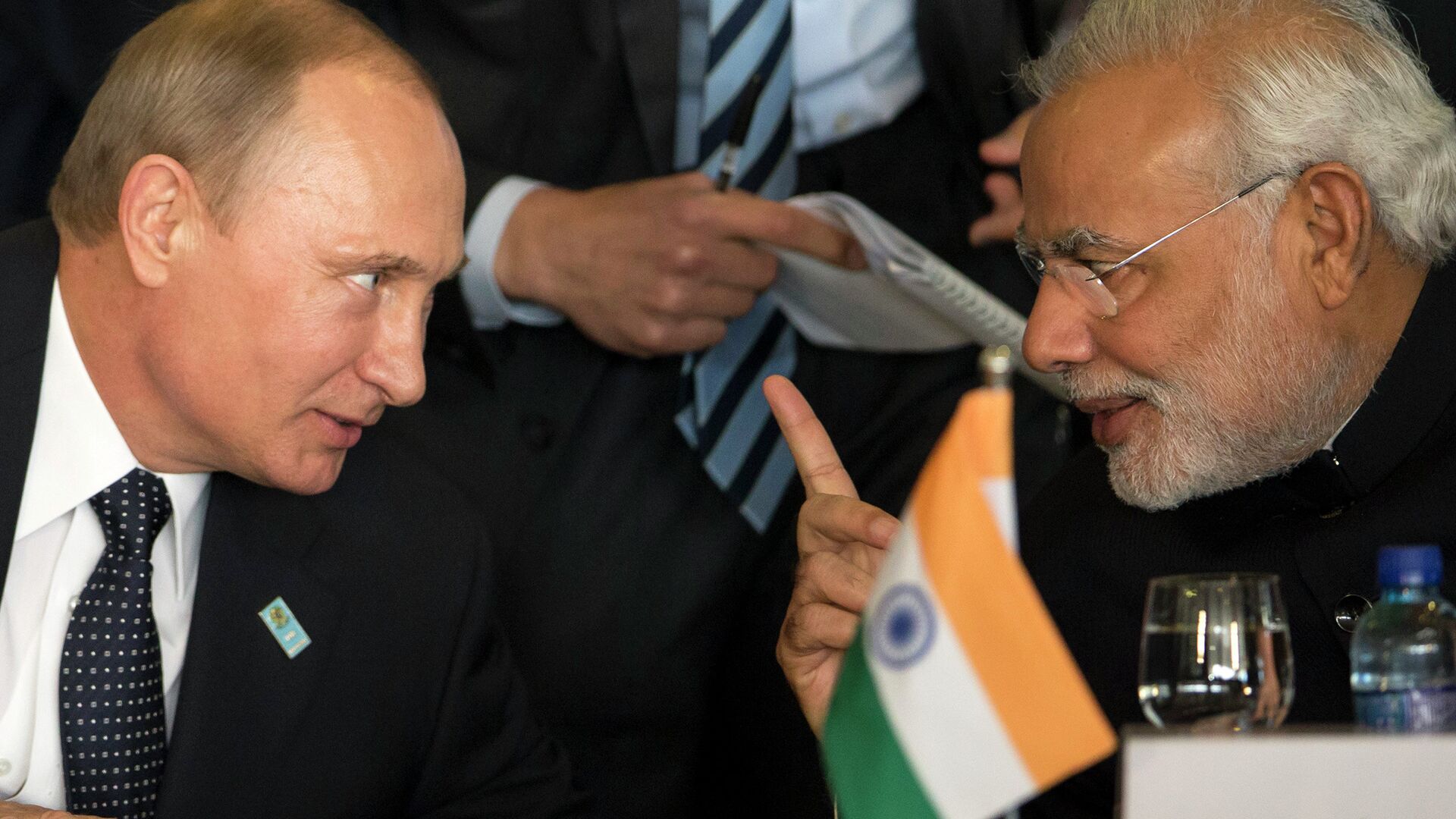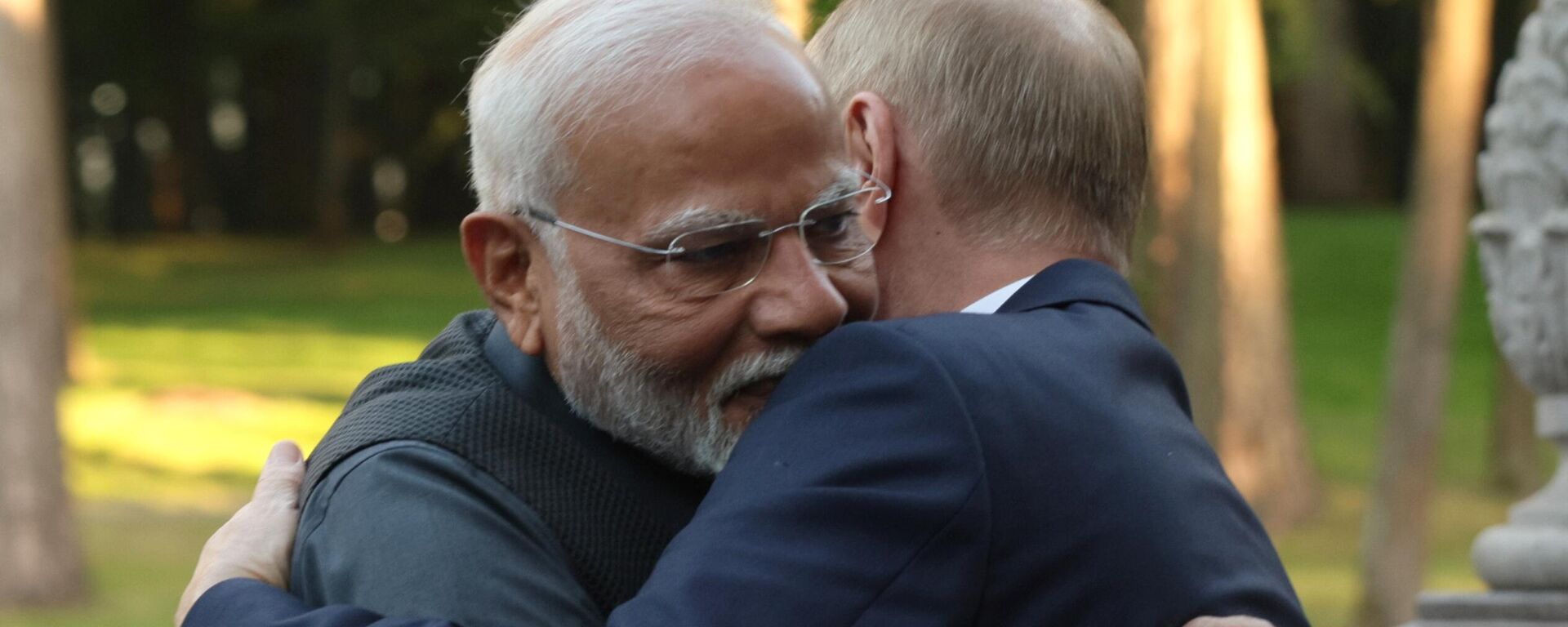https://sputniknews.in/20250505/russia-stands-firm-on-terrorism-avoids-eu-and-us-hipocrcisy-experts-9068814.html
Russia Stands Firm on Terrorism, Avoids EU and US Hypocrisy: Experts
Russia Stands Firm on Terrorism, Avoids EU and US Hypocrisy: Experts
Sputnik India
Russia understands India's concerns about cross-border terrorism much better than the US and European Union (EU), Indian experts have told Sputnik India
2025-05-05T21:06+0530
2025-05-05T21:06+0530
2025-05-05T21:21+0530
indo-russian relations
vladimir putin
s. jaishankar
sergey lavrov
india
russia
pakistan
european union (eu)
bharatiya janata party (bjp)
un security council (unsc)
https://cdn1.img.sputniknews.in/img/07e8/03/12/6866696_0:135:2601:1598_1920x0_80_0_0_1d26fc124c29312a85972d9aec897464.jpg
Russia understands India's concerns about cross-border terrorism much better than the United States and European Union (EU), Indian experts have told Sputnik India following the telephone call between Prime Minister Narendra Modi and President Vladimir Putin on Monday.Putin’s statement wasn’t “trying to bind India and urging it to exercise restraint” in pursuit of accountability, unlike those by other world leaders and governments, the Indian veteran pointed out. Hours after the Pahalgam attack, Putin had issued a strong-worded statement calling for accountability into the incident.Significantly, EU foreign policy chief Kaja Kallas told External Affairs Minister (EAM) S Jaishankar last week that there was a need for “restraint” on part of both India and Pakistan in order to deescalate tensions. Meanwhile, US Vice-President JD Vance, who was on a visit to India when the Pahalgam terror attack happened, said in a media interview that response shouldn't lead to a "broader regional conflict", while also asking Pakistan to cooperate in India’s probe.The statements by western leaders have been met with some criticism in India.Citing the Russian leader’s statement, Asthana noted that Putin was on the same page as Modi on taking firm action against the terrorists and their backers.India expects no external support in addressing cross-border terrorism and remains resolute in ensuring that those responsible for the Pahalgam attack, including any potential state-backed entities are held accountable, Asthana emphasised. He noted that Russia appears to have a clear understanding of this stance.There has been a sense of hypocrisy on part of EU and the US following the Pahalgam terror attack, Bharatiya Janata Party (BJP) leader Savio Rodrigues told Sputnik India.The ruling party politician accused the West of trying to have it both ways as far as the issue of terrorism is concerned.Russia’s uncompromising stance on the Pahalgam terrorist attack was also crucial due to its stature as a Permanent Member of the UN Security Council (UNSC), Rodrigues said.He said that having grappled with terrorism on its soil for years, Russia understood the dangers of the menace and the need to tackle it firmly, something which has been reflected not only in India-Russia bilateral statements but also in joint statements of groupings such as Shanghai Cooperation Organisation (SCO) and BRICS.The Putin-Modi call was preceded by seperate conversations between Russian Foreign Minister Sergey Lavrov and Jaishankar as well as Pakistan Deputy Prime Minister and Foreign Minister Ishaq Dar.Lavrov told Dar that Russia was ready to “contribute to a political settlement” of differences between India and Pakistan should both sides be “interested”.In his call with Jaishankar last week, Lavrov called for resolving the differences through established pacts such as the Simla Agreement of 1972 and the Lahore Declaration of 1999, according to the Russian Foreign Ministry.
https://sputniknews.in/20250505/modi-conveys-congratulations-to-putin-on-80th-anniversary-of-victory-day-9068156.html
india
russia
pakistan
us
Sputnik India
feedback.hindi@sputniknews.com
+74956456601
MIA „Rossiya Segodnya“
2025
Dhairya Maheshwari
https://cdn1.img.sputniknews.in/img/07e6/0c/13/138962_0:0:641:640_100x100_80_0_0_2cb44360dbcdf6d84bf4b299cd045917.jpg
Dhairya Maheshwari
https://cdn1.img.sputniknews.in/img/07e6/0c/13/138962_0:0:641:640_100x100_80_0_0_2cb44360dbcdf6d84bf4b299cd045917.jpg
News
en_IN
Sputnik India
feedback.hindi@sputniknews.com
+74956456601
MIA „Rossiya Segodnya“
Sputnik India
feedback.hindi@sputniknews.com
+74956456601
MIA „Rossiya Segodnya“
Dhairya Maheshwari
https://cdn1.img.sputniknews.in/img/07e6/0c/13/138962_0:0:641:640_100x100_80_0_0_2cb44360dbcdf6d84bf4b299cd045917.jpg
modi putin call, pahalgam terrorist attack, modi news, india pakistan war, modi trump call, ukraine news, kashmir, pakistan news, the resistance front, let
modi putin call, pahalgam terrorist attack, modi news, india pakistan war, modi trump call, ukraine news, kashmir, pakistan news, the resistance front, let
Russia Stands Firm on Terrorism, Avoids EU and US Hypocrisy: Experts
21:06 05.05.2025 (Updated: 21:21 05.05.2025) In a telephone call on Monday, President Putin told PM Modi that the fight against terrorism must be "uncompromising" and urged bringing the perpetrators and backers of the Pahalgam terror attack to justice, according to the Kremlin and MEA.
Russia understands India's concerns about cross-border terrorism much better than the United States and European Union (EU), Indian experts have told Sputnik India following the telephone call between Prime Minister Narendra Modi and President Vladimir Putin on Monday.
"There is no doubt that terrorism must be dealt with in all its forms and manifestation. There is a common understanding between India and Russia on that," retired Major General Shashi Bhushan Asthana, Director General of United Services Institution (USI) of India, stated.
Putin’s statement wasn’t “trying to bind India and urging it to exercise restraint” in pursuit of accountability, unlike those by other world leaders and governments, the Indian veteran pointed out. Hours after the Pahalgam attack, Putin had issued a strong-worded statement calling for accountability into the incident.
“Russia has put no such expectations on India, as seen from the Kremlin statement,” Asthana noted.
Significantly, EU foreign policy chief Kaja Kallas told External Affairs Minister (EAM) S Jaishankar last week that there was a need for “restraint” on part of both India and Pakistan in order to deescalate tensions. Meanwhile, US Vice-President JD Vance, who was on a visit to India when the Pahalgam terror attack happened, said in a media interview that response shouldn't lead to a "broader regional conflict", while also asking Pakistan to cooperate in India’s probe.
The statements by western leaders have been met with
some criticism in India.
Citing the Russian leader’s statement, Asthana noted that Putin was on the same page as Modi on taking firm action against the terrorists and their backers.
“In a way, Russia’s support for India on the fight against cross-border terrorism is reciprocal,” the think-tanker said, noting India's neutral stance on the Ukraine issue despite Western pressure.
“Russia has genuine security concerns, which India seems to understand quite well. Similarly, India’s security concerns vis-a-vis cross border terrorism have been understood by Russia.”
India expects no external support in addressing cross-border terrorism and remains resolute in ensuring that those responsible for the Pahalgam attack, including any potential state-backed entities are held accountable, Asthana emphasised. He noted that Russia appears to have a clear understanding of this stance.
There has been a sense of hypocrisy on part of EU and the US following the Pahalgam terror attack, Bharatiya Janata Party (BJP) leader Savio Rodrigues told Sputnik India.
“Putin’s not doing what the US and the EU normally do, which it is doublespeak. I think he's being very clear that terrorism needs to be eradicated. Therefore, when President Putin tells PM Modi that we should be uncompromising as far as our common fight against terrorism goes, then I believe he is speaking in the interest of India,” Rodrigues stated.
The ruling party politician accused the West of trying to have it both ways as far as the issue of terrorism is concerned.
“They would like to keep Pakistan in good books, a product of Cold War history. The US won’t act against terrorism until it is directly impacted by it,” Rodrigues asserted.
Russia’s uncompromising stance on the Pahalgam terrorist attack was also crucial due to its stature as a Permanent Member of the UN Security Council (UNSC), Rodrigues said.
“In fact, Russia could act as a bridge between India and China to deal with cross-border terrorism. Russia is the only country that has the capacity to play such a role,” said Rodrigues.
He said that having grappled with terrorism on its soil for years, Russia understood the dangers of the menace and the need to tackle it firmly, something which has been reflected not only in India-Russia bilateral statements but also in joint statements of groupings such as Shanghai Cooperation Organisation (SCO) and BRICS.
The Putin-Modi call was preceded by
seperate conversations between
Russian Foreign Minister Sergey Lavrov and Jaishankar as well as Pakistan Deputy Prime Minister and Foreign Minister Ishaq Dar.
Lavrov told Dar that Russia was ready to “contribute to a political settlement” of differences between India and Pakistan should both sides be “interested”.
In his call with Jaishankar last week, Lavrov called for resolving the differences through established pacts such as the Simla Agreement of 1972 and the Lahore Declaration of 1999, according to the Russian Foreign Ministry.



